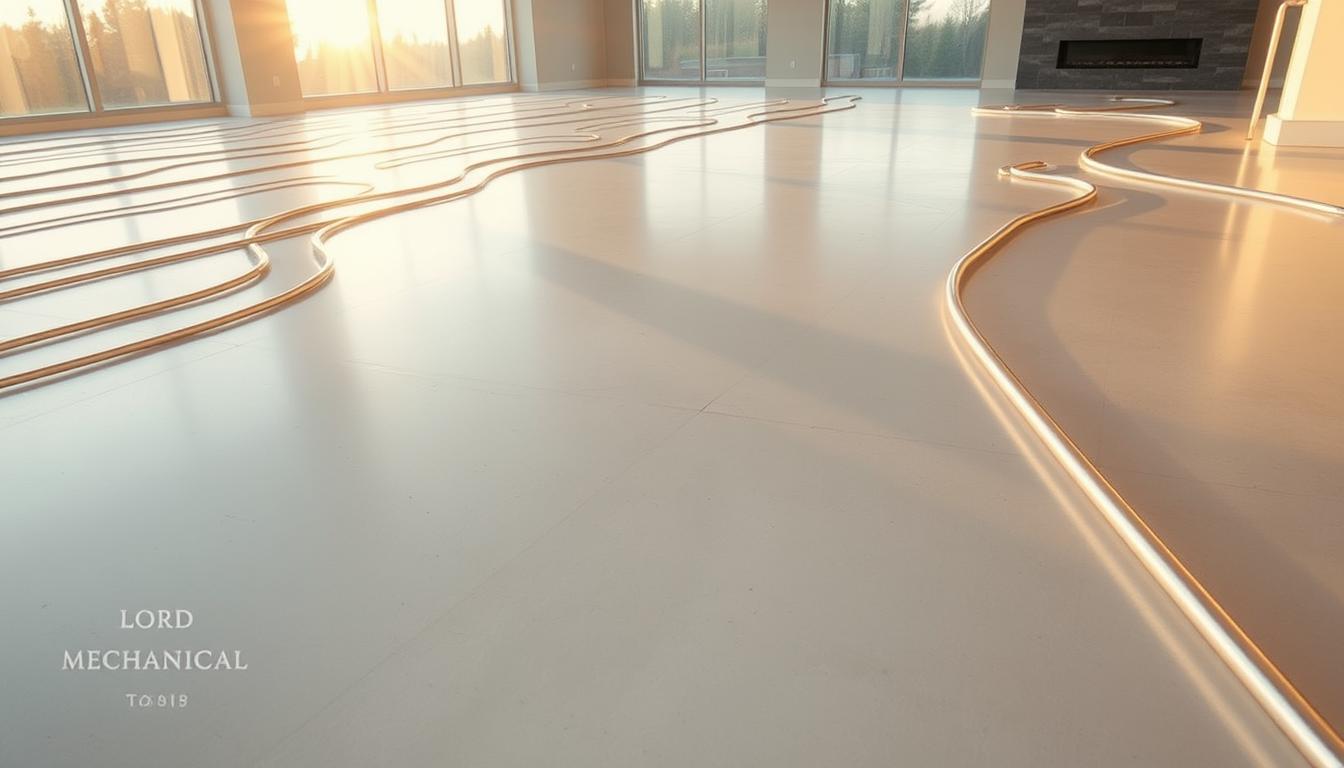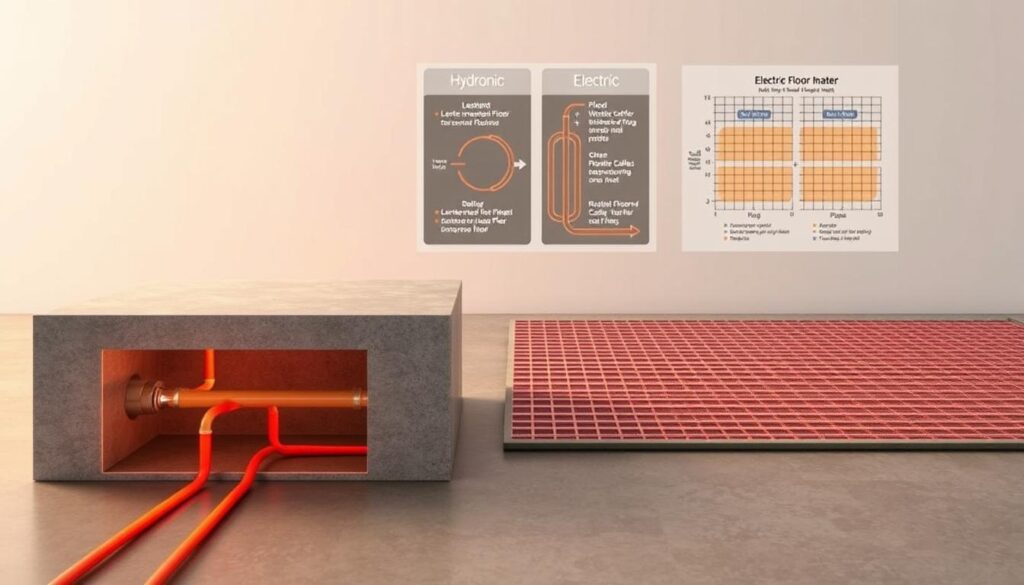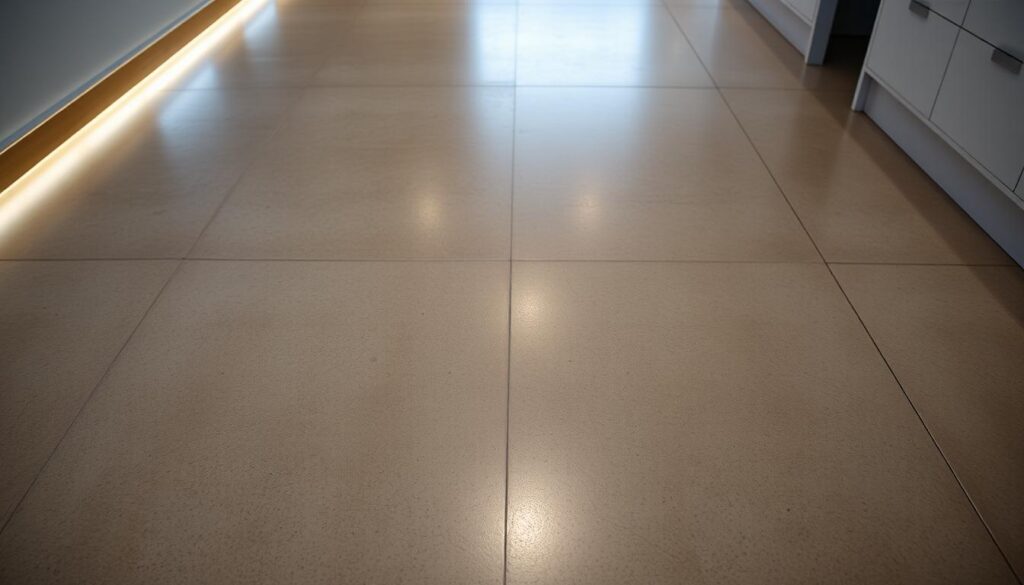
Have you ever wondered if your home could feel warmer, quieter and cleaner without noisy ducts?
We design and install radiant floor heating systems that warm rooms from the ground up. Using hydronic tubes or electric cables, these systems deliver even heat, fewer drafts and less dust than forced-air heating.
Our team explains the best option for your home: hydronic for whole-home solutions and new builds, or electric for targeted rooms and retrofits. We handle installation methods— in-slab, over-subfloor panels and between-joist approaches— to minimise disruption in North Vancouver and West Vancouver.
We set clear expectations on costs and warranties, show how proper insulation boosts efficiency, and ensure UL/CSA and GFCI compliance. Call Lord Mechanical at 604‑670‑3737 to plan a tailored quote and timeline for your installation.
Key Takeaways
- We install trusted floor heating systems suited to your home and budget.
- Hydronic systems suit whole-home projects; electric is ideal for retrofits.
- Expect quieter, cleaner operation and fewer cold spots than forced-air.
- We ensure compliance with UL/CSA standards and offer clear cost ranges.
- Call Lord Mechanical at 604‑670‑3737 for a tailored quote and timeline.
Buyer’s guide overview: is radiant floor heating right for your Canadian home today?
Choosing a new heating approach for your home requires clear cost and performance facts. This short guide helps you decide by comparing comfort gains, upfront costs and realistic timelines for North Vancouver projects.
User intent and how this guide helps you decide
We wrote this section for homeowners who want a practical lens on comfort and value. You’ll find cost ranges, operating examples and when each system makes sense for renovations or new builds.
Key takeaways at a glance: comfort, costs, and installation timing
- Comfort: Even warmth and quieter rooms, often with 25–30% lower energy use vs traditional heating.
- Upfront costs: Hydronic typically $6–$20/sq ft; electric about $11–$22/sq ft installed.
- Operating costs: Small bathroom (50–150 sq ft) can run ~$17–$86/month at $0.16/kWh.
- Timing: Factor lead times, curing windows and any electrical upgrades into your schedule.
Next step: Call Lord Mechanical at 604‑670‑3737 to confirm scope, cost estimates and installation windows for your home.
How radiant heating works versus traditional forced-air systems
Let’s look at how under-surface heat transfer differs from forced-air circulation and why that matters.
From ground-up warmth: hydronic tubes and electric cables under your floors
Hydronic installs use 1/2″ PEX loops to circulate hot water from a boiler or water heater. Tubes sit in concrete or on subfloors to radiate steady, even heat to room surfaces.
Electric solutions use thin cables or mats roughly 1/8″ thick and run about 9–15 W/sq ft. These electric floor elements are slim, fast to respond and fit well in retrofits.
Even heat, quieter rooms, and cleaner air compared to ducts and vents
Ground-up delivery cuts temperature swings. Because heat moves directly to people and surfaces, you stay comfortable at lower setpoints with fewer drafts than with forced air.
- Less stratification — ceilings aren’t overly warm while feet stay cold.
- Eliminates duct losses and reduces dust circulation, improving air quality.
- Zoning with precise thermostats matches output to each room and boosts efficiency.
- No blower noise — living spaces stay quiet and calm.
“Embedded tubing and slim electric mats provide steady warmth with minimal noise and better indoor air.”
We size and specify each system to your assembly and climate. Call Lord Mechanical at 604‑670‑3737 to plan a solution for North and West Vancouver homes.
Types of floor heating systems: hydronic and electric compared
Choosing the right system starts with matching performance to your home’s layout and renovation goals.
Hydronic systems suit whole-home projects and new builds. They integrate with gas, oil, solar thermal or geothermal sources to deliver low operating costs across large areas. Typical installations include in-slab concrete for thermal mass, over-subfloor grooved panels for speed, or between-joist layouts with aluminium plates for retrofits.
Hydronic systems: best for whole-home, new builds, and renewable integration
We specify hydronic loops when primary heat and long-term efficiency matter. These systems work well with boilers and renewable sources and pair with zoned controls for precise comfort.
Electric radiant systems: ideal for bathrooms, kitchens, and retrofits
Electric systems use cables or mesh mats under tile, stone, laminate and some vinyl. They typically deliver 9–15 W/sq ft, are UL/CSA listed and often carry warranties up to 25 years. They’re fast to install and perfect for spot-heating or smaller rooms.

Installation methods: concrete slab, subfloor panels, and between-joist options
We match installations to your structure and finish flooring. Tile and stone fare best; engineered wood can work within temperature limits. For moisture-prone areas, we specify membranes and uncoupling systems to protect tile and manage movement.
- Compare options: hydronic for expansive areas; electric for targeted rooms and quick retrofits.
- Controls: zoned thermostats and sensors keep rooms accurate and efficient.
- Value: we weigh upfront cost versus operating savings so you choose the right long-term solution.
“Choose the method that fits your assembly, timeline and budget for lasting comfort.”
Call Lord Mechanical at 604‑670‑3737 for a side-by-side proposal tailored to North Vancouver and West Vancouver projects.
Radiant heating benefits that add comfort, efficiency, and value
Even, steady warmth underfoot can transform daily comfort and improve indoor air quality.
Consistent warmth with no cold spots or drafts
Enjoy consistent warmth across entire surfaces. You no longer step onto cold tiles or move space heaters to chase uneven zones.
We size and zone each system to match a room’s heat loss so warmth feels steady and controlled.
Silent operation and improved indoor air quality
These systems run quietly — no blower noise — which helps acoustic comfort in bedrooms and home offices.
With minimal air movement, you also reduce dust circulation and support better air quality for sensitive occupants.
Energy efficiency gains and potential resale lift
Avoiding duct losses and reducing stratification improves energy efficiency. You often feel comfortable at lower setpoints.
The upgrade in bathrooms and kitchens adds visible value. Homes with embedded systems can sell faster in competitive markets.
“High build quality and correct floor prep protect finishes and preserve long-term performance.”
- We free wall space by removing bulky radiators and baseboards.
- Smart thermostats and schedules cut waste without losing comfort.
- Our proposals list projected comfort, operating notes and expected benefits so you know the outcome.
Ready to discuss specific benefits for your North or West Vancouver home? Call Lord Mechanical at 604‑670‑3737 for a tailored proposal.
Cost guide: upfront installation, operating costs, and long‑term value
To budget wisely, homeowners need clear cost ranges and what truly drives those numbers. We present typical installed prices and the variables that affect your final proposal.
Installed cost benchmarks: hydronic systems generally run about $6–$20 per sq ft installed. Electric solutions usually sit between $11–$22 per sq ft for professional installation.
What drives pricing
Price depends on area size, system type, and project complexity. Floor prep, finish flooring, and any mechanical or electrical upgrades add cost.
Operating costs today
Expect about $0.07–$0.36 per hour in operating cost. Small bathrooms (50–150 sq ft) commonly cost $17–$86 per month at $0.16/kWh. Insulation, local rates and thermostat schedules change those numbers.
Total cost of ownership
Hydronic often lowers long‑term heating costs over large areas. Electric excels in small zones with predictable upfront costs. We factor ~25–30% energy savings versus forced air, plus comfort and resale value, when framing payback.
- We list clear upfront costs by system and project scale.
- Smart thermostats and good insulation cut run time by 15–20%.
- Our proposals include line‑item cost, operating estimates and timelines so you can decide with confidence.
Ready for a tailored cost estimate? Call Lord Mechanical at 604‑670‑3737 for a site assessment and detailed project pricing for North and West Vancouver homes.
Energy efficiency and performance in Canadian conditions
Cold Canadian winters demand systems that keep heat where people live, not in vents or ceilings.
Eliminating duct losses and reducing stratification cuts wasted energy. By moving warmth from the sub‑surface into living spaces, we avoid losses tied to long duct runs and warm‑ceiling layers. That means steadier comfort and lower bills in tall rooms or older homes.
Proper insulation under the heating layer is critical. It directs energy upward into the room, not down into the structure. Good insulation plus high‑conductivity finishes like tile or stone improves overall efficiency.
Controls, zoning and smart thermostats
Zoning matches output to each room’s heat needs. This reduces runtime and cuts seasonal costs.
Smart thermostats and adaptive schedules can save about 15–20% by aligning delivery with occupancy. We size watt density and loop spacing to match your assembly and climate for stable operation.
“Hydronic systems pair well with high‑efficiency boilers or heat pumps; electric zones work great for quick, targeted comfort.”
- We verify sensors and floor‑limit settings to protect finishes and preserve performance.
- Material choices and correct sizing reduce energy waste and ensure consistent heat transfer.
- Our commissioning checks controls, insulation and schedules to lock in long‑term efficiency.
Want us to assess efficiency gains for your North or West Vancouver home? Call Lord Mechanical at 604‑670‑3737 for a site evaluation and tailored proposal.
Flooring and room suitability: where radiant floors shine
Your choice of flooring and room use determines which system will deliver the best results.
Best finish materials
Ceramic tile and stone provide the fastest, most even heat transfer thanks to high conductivity. These finishes are ideal where immediate surface warmth matters.
Engineered wood can work well when we follow manufacturer temperature limits and use sensors to prevent overheating.
Room-by-room guidance
- Bathroom: Electric mats deliver quick comfort for bare feet and are a top option for small rooms.
- Kitchen: Tile or vinyl with electric or hydronic systems work well in high-use areas.
- Living areas & bedrooms: Electric foil under floating floors gives comfort with minimal height change.
- Basements: In-slab or over-slab hydronic installs counteract cold slabs and improve usability.
Special areas and outdoor options
Garages and workshops often suit in-slab cable. For driveways and walkways, snow-melt systems in concrete or pavers keep paths safe in winter.
“Tile and stone deliver the best heat transfer; carpet and thick pads reduce performance unless carefully selected.”
| Finish | Best System | Performance Notes |
|---|---|---|
| Tile/Stone | Electric mats or hydronic slab | Fast response, excellent transfer |
| Engineered wood | Low-temp electric or hydronic with controls | Works if temperature limits respected |
| Carpet | Foil mats or avoid heavy padding | Low-pile and thin pads maintain better output |
| Outdoor/paved | In-slab cable / snow-melt | Protects against snow and ice; durable |
We review space-by-space costs and payback so you know where comfort justifies the cost. Call Lord Mechanical at 604‑670‑3737 to discuss options for your North or West Vancouver home.
Radiant floor heating installation: professional standards and timing
A correctly staged installation prevents costly delays and preserves your finish-floor warranty. We plan each phase so trades work in sequence, and curing or staging times are respected.
New construction vs retrofit: choosing the right approach
In new builds we embed tubes or in-slab cables for thermal mass and long life. For retrofits, over-subfloor panels or between-joist aluminium plates reduce demolition while keeping performance high.
Electrical and code considerations in Canada
Our electricians verify UL/CSA compliance, correct voltage (120/240V) and GFCI protection for electric systems. We test cables and sensors and document results before covering to protect warranties and meet local code.
Why proper preparation matters
Subfloor flatness, moisture checks and the right insulation strategy direct heat upward and extend service life. Membranes, decoupling layers and waterproofing protect tile in wet areas.
“Thorough prep, staged work and documented testing deliver consistent performance and lasting quality.”
- We coordinate inspections and provide as-built documentation.
- We schedule curing and commissioning to avoid rushed steps.
- Call Lord Mechanical at 604‑670‑3737 to discuss your project and our installation standards.
Professional install vs DIY: making the right choice in North Vancouver
Deciding between a professional install and a DIY approach can save time and avoid costly mistakes on your project.
When work includes complex layouts, multiple zones, high-end finishes, or electrical panel upgrades, we recommend hiring a pro. Licensed installers protect long-term warranties, ensure code compliance, and handle GFCI circuits and load calculations safely.
When to hire a pro: complex layouts, warranty protection, and safety
Hire a professional if your space has odd shapes, stacked zones, or needs breaker changes. Our team manages breaker sizing, sensor placement and system commissioning to prevent rework.
DIY-suitable scenarios: small rectangular rooms with existing capacity
DIY can work for a simple, rectangular bathroom or short hallway under 100–150 sq ft. Use vendor-backed electric mats, follow instructions closely, and confirm your panel has spare capacity.
We still recommend a verification step. Even for DIY projects, we can supply layout plans, materials lists and commissioning checks to protect value and finishes.

Partner with Lord Mechanical: local expertise, tailored designs, and support at 604‑670‑3737
- We weigh upfront costs vs long-term value and advise the best route for your home.
- We provide design, permitting support and clean coordination with your contractor.
- For DIY-friendly jobs, we offer material packs and commissioning support on request.
“Professional installation reduces risk, preserves warranties and ensures even heat coverage across every room.”
| Scenario | Recommended Route | Why |
|---|---|---|
| Complex layout or multiple zones | Professional install | Ensures even coverage, code compliance, and warranty protection |
| Small rectangular bathroom (≤150 sq ft) | DIY possible with support | Simple mats, vendor guides, minimal electrical changes |
| High-end finishes or panel upgrades | Professional install | Protects finishes, manages electrical upgrades and testing |
Local knowledge matters. As North and West Vancouver specialists, we handle permits, product availability and climate considerations to protect comfort and value.
Ready to decide? Call Lord Mechanical LTD at 604‑670‑3737 and we’ll confirm the best route—professional install or guided DIY—for your project.
Radiant floor heating
Under-surface systems deliver consistent warmth that changes how a room feels without adding bulk to walls.
Radiant floor heating is an umbrella term for hydronic and electric solutions that warm rooms from the ground up. Both types provide even temperatures, quiet operation and fewer airborne dust particles than ducted systems.
Electric options usually run about 9–15 W/sq ft and suit quick retrofits or single-room projects. Hydronic installs fit whole-home plans and large areas where long-term efficiency matters.
- Versatile for bathrooms, kitchens, basements and living areas.
- Energy savings often reach 25–30% versus forced-air by cutting duct losses and stratification.
- Best surface materials include tile and stone; engineered wood works with controlled limits.
- Installations vary: in-slab, over-subfloor panels and between-joist methods.
We tailor watt density, loop spacing, controls and insulation to each structure and finish. That ensures efficient operation and lasting comfort across the home.
“Choose the right type and installation path to match your assembly and daily use.”
Call Lord Mechanical LTD in North Vancouver and West Vancouver at 6046703737 to review types, areas of application and next steps for your project.
Conclusion
A well‑planned system brings steady comfort, clear costs and fewer surprises across your project. We summarise key choices so you can move forward with confidence.
For Canadian homes we match radiant floor solutions to each space. Choose between hydronic or electric types and install methods that suit your areas, finishes and timeline. Typical installed ranges are about $6–$20/sq ft for hydronic and $11–$22/sq ft for electric.
Operational cost depends on size, usage and insulation. Smart thermostats, zoning and proper controls cut runtime and energy use. UL/CSA compliance and GFCI protection are essential for safe electric installs.
The benefits: even, quiet comfort, strong efficiency and better perceived value in high‑use rooms. We scope your needs, confirm electrical or mechanical requirements and schedule work to protect quality and finishes.
Ready to discuss options and a detailed cost estimate for your North or West Vancouver home? Call Lord Mechanical LTD at 604‑670‑3737 to get started.

